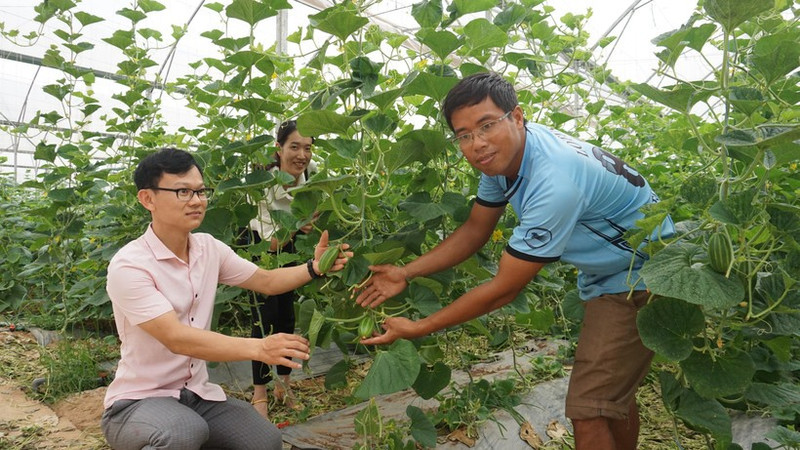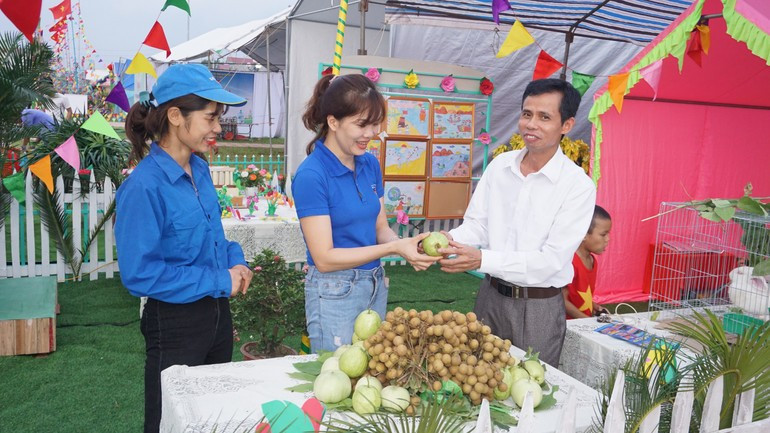Highlighs from clean agriculture models
In line with the goal of sustainable new-style rural development, authorities in Bac Giang Province have been striving to establish numerous clean agriculture cooperatives applying high technology. These efforts not only boost economic growth but also ensure safe meals for families.

A pioneer with vision and determination
Born in 1985, Tran Xuan Dang is a chemical engineer who graduated from Ha Noi University of Science and Technology and earned a master's degree in Singapore. Despite holding a well-paid and stable job, he was always driven by a dream: to bring high technology back to the fields of his hometown.
After travelling far and wide to gain experience, in 2017 he returned to Tri Yen Commune (Bac Giang City), consolidated and leased land, and began cultivating high-tech vegetables. He established the Tri Yen High-Tech Agricultural Cooperative. Dang shared: “Clean, high-tech farming is a long-term path and also my way of expressing gratitude to my family and homeland.”
Today, the cooperative led by Dang has become a popular destination for customers who come both to shop and experience farm life. “We sell everything we produce,” he said. “Customers can pick, weigh, and pay by themselves – it’s also a way to build trust and demonstrate that what we do is real and honest.”
The Tri Yen cooperative uses Israeli technology, with all processes meeting international standards. The fruits and vegetables produced can be eaten straight from the garden. Thanks to greenhouse systems, the cooperative can produce three crops per year, with yields three to four times higher than traditional methods.
Beyond building his own success, Dang also inspires and supports dozens of other young people within and beyond the province. He helps them with technical guidance and market access through supermarket connections, ensuring stable product output and building a community of young people pursuing modern agriculture together.
In recent years, Bac Giang Province has prioritised the development of value chain-linked agricultural models to increase productivity and quality of crops and livestock, raise product value, and gradually improve farmers’ incomes – contributing to agricultural economic development and rural construction.
Replicating models
Founded in September 2016, the Yen Dung Clean Vegetable Cooperative (Bac Giang City) initially faced many difficulties, including land consolidation, lack of experience, and limited consumption channels. However, thanks to the long-term vision and bold determination of its farmers, the cooperative invested in a modern greenhouse system equipped with sun-filtering mesh, ventilation fans, windproof curtains, and an Israeli drip irrigation and fertilisation system.

More than just a technological upgrade, the cooperative adheres to the “five no’s” principle in production: no pesticides, no preservatives, no herbicides, no genetically modified organisms, and no growth stimulants. After eight years of development, the cooperative has expanded to over 65 hectares of cultivated land, including 17 hectares managed under a high-tech greenhouse model with automated fertilisation.
The cooperative now grows about 60 types of vegetables and fruits, with core products including greenhouse and net-house crops such as Korean melon, cucumber, tomato, cantaloupe, baby cucumber, and Hoang Hau melon – all of which deliver high economic value.
Bac Giang also boasts many other effective clean agriculture models. In Hiep Hoa District, the Thai Son Cooperative has implemented a production model for the traditional Nep cai hoa vang glutinous rice variety. Through this model, cooperative members receive regular training, technical support, market access, and production linkage assistance from specialised agencies.
It is clear that the development of smart, green agriculture is the right direction. These models help ensure food safety, protect the environment, and deserve to be further replicated.








